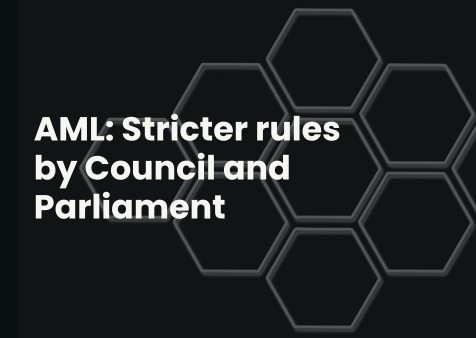The Council and Parliament of the EU provisionally agreed upon upgrading several parts of the anti-money laundering package, aiming to protect EU citizens and the EU’s financial system against money laundering and terrorist financing.
Under the new agreement, the rules applicable to the private sector will be transferred to a new regulation, while the organization of AML/CFT combat systems at Member State level will be regulated by a relevant directive.
The provisional agreement on an anti-money laundering regulation will, for the first time, exhaustively harmonise rules throughout the EU.
The updates of the AML package are separated in two main pillars as follows:
1. Anti-money laundering regulation
A. Obliged entities: The list of obliged entities has been expanded to include new bodies which are the crypto-asset service providers (CASPs), traders of luxury goods and professional football clubs and agents. The due diligence and reporting obligations vary depending on the type of entity. Also, obliged entities will need to apply enhanced due diligence measures to occasional transactions and business relationships involving high-risk third countries which could be a threat to the integrity of the EU’s internal market.
B. Enhanced due diligence: Specific enhanced due diligence measures will apply to cross-border correspondent relationships for crypto-asset service providers, while credit and financial institutions will follow more specific and strengthened due diligence measures when assessing high net-worth individuals with large amounts of assets.
C. Cash payments: The EU-wide maximum limit for cash payments is set to €10.000 while member states may use their discretion to impose a lower maximum limit. Moreover, obliged entities should identify and verify the identity of an individual carrying out an occasional transaction in cash between €3.000-€10.000.
D. Beneficial ownership: The rules on beneficial ownership and multi-layered ownership and control structures are clarified, beneficial ownership is based on two components – ownership and control. The beneficial ownership threshold is set at 25% and applies to both EU entities and non-EU entities doing business or buying property in the EU. Registration of the beneficial ownership of all foreign entities that own real estate with retroactivity until 1 January 2014.
E. High-risk third countries: Enhanced due diligence measures will be required for the occasional transactions and business relationships involving high-risk third countries.
2. The 6th Anti-money laundering directive
A. Beneficial ownership registers: The information submitted to the central register should be verified, while sanctioned entities or individuals should be flagged. The entities in charge of the registers are authorized to inspect the premises of the registered legal entities if deemed necessary, while persons of the public with legitimate interest, including press and civil society, may also access the registers. In addition, real estate registers should be accessible to competent authorities through a single access point, to facilitate investigations of criminal cases.
B. Financial intelligence unit (FIU) responsibilities: The FIU of each member state will have immediate and direct access to financial, administrative and law enforcement information and will continue to share information to competent authorities while ensuring that fundamental rights are taken into consideration. Furthermore, the agreement sets out the context in which FIUs will be able to suspend or withhold consent for a transaction under investigation.
C. Supervision: All obliged entities are subject to adequate and effective supervision and suspicious behaviour will be reported to the member state’s FIU. In addition, new supervisory measures will apply to the non-financial sector, by the so-called supervisory colleges, and the new Anti-Money Laundering Authority (AMLA) will prepare draft regulatory technical standards.
D. Risk assessment: The Commission will carry out an EU level evaluation and provide recommendation to member states with regards to the risk assessment they carry out, aiming to effectively mitigate any money laundering and terrorist financing risks.
The legislative proposals are pending approval before being formally adopted and entered into force by the Council and the Parliament. This provisional agreement will carefully align EU rules, minimize possible risks of unlawful activities in the financial system, and strengthen the national AML systems for combating fraudulent and illegal proceeds.
Official source here
